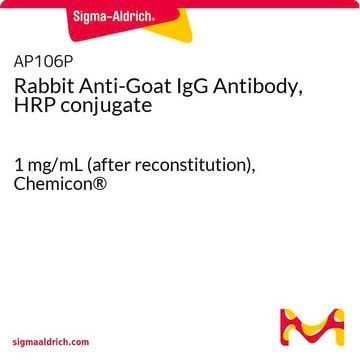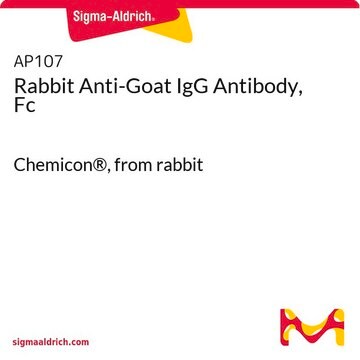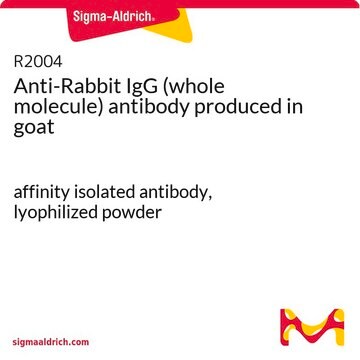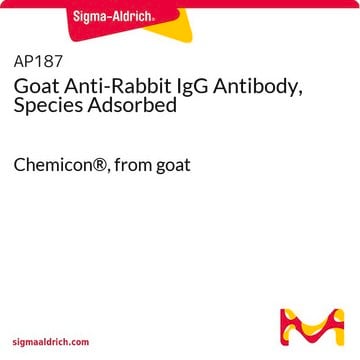AP106
Rabbit Anti-Goat IgG Antibody
2.0 mg/mL, Chemicon®
Sign Into View Organizational & Contract Pricing
All Photos(1)
About This Item
UNSPSC Code:
12352203
eCl@ss:
32160702
NACRES:
NA.46
Recommended Products
biological source
rabbit
Quality Level
conjugate
unconjugated
clone
polyclonal
species reactivity
goat
manufacturer/tradename
Chemicon®
concentration
2.0 mg/mL
technique(s)
ELISA: suitable
immunoprecipitation (IP): suitable
western blot: suitable
shipped in
wet ice
target post-translational modification
unmodified
Related Categories
Specificity
Reacts with Goat IgG gamma chain, as well as the light chains from all Goat immunoglobulin classes. Monospecific on IEP against whole Goat Serum. Single band on IEP at a concentration of 10 mg/mL when run against anti-whole serum.
Immunogen
Highly purified Goat IgG isolated from pooled normal Goat Serum.
Application
Detect Goat IgG using this Rabbit anti-Goat IgG Antibody validated for use in ELISA, IP & WB.
NOTE:
Due to the wide range of variable immunoassays for which this product is intended, it is necessary that each laboratory establish individual performance characteristics for all assay components in any specific assay system.
For use in Research and Manufacturing only.
Not intended for direct use in diagnostic applications.
Due to the wide range of variable immunoassays for which this product is intended, it is necessary that each laboratory establish individual performance characteristics for all assay components in any specific assay system.
For use in Research and Manufacturing only.
Not intended for direct use in diagnostic applications.
Research Category
Secondary & Control Antibodies
Secondary & Control Antibodies
Research Sub Category
Whole Immunoglobulin Secondary Antibodies
Whole Immunoglobulin Secondary Antibodies
Physical form
Nonsterile liquid. Buffer=0.02M Phosphate Buffer,
0.25M Sodium Chloride and 0.1% Sodium Azide. Filtered through a 0.45 micron membrane filter.
0.25M Sodium Chloride and 0.1% Sodium Azide. Filtered through a 0.45 micron membrane filter.
Storage and Stability
Store at +2-8°C for up to 6 months.
Legal Information
CHEMICON is a registered trademark of Merck KGaA, Darmstadt, Germany
Disclaimer
Unless otherwise stated in our catalog or other company documentation accompanying the product(s), our products are intended for research use only and are not to be used for any other purpose, which includes but is not limited to, unauthorized commercial uses, in vitro diagnostic uses, ex vivo or in vivo therapeutic uses or any type of consumption or application to humans or animals.
Storage Class Code
10 - Combustible liquids
WGK
WGK 2
Flash Point(F)
Not applicable
Flash Point(C)
Not applicable
Certificates of Analysis (COA)
Search for Certificates of Analysis (COA) by entering the products Lot/Batch Number. Lot and Batch Numbers can be found on a product’s label following the words ‘Lot’ or ‘Batch’.
Already Own This Product?
Find documentation for the products that you have recently purchased in the Document Library.
Up-regulation of METCAM/MUC18 promotes motility, invasion, and tumorigenesis of human breast cancer cells.
Zeng, GF; Cai, SX; Wu, GJ
BMC Cancer null
Kun-Chun Chiang et al.
Anticancer research, 37(11), 6215-6221 (2017-10-25)
Pancreatic neuroendocrine tumors (PanNETs) are usually diagnosed in an advanced stage. Most patients with PanNETs die of metastasis. Vascular endothelial growth factor-A (VEGF-A) is a strong stimulator of angiogenesis and tumor metastasis. We aimed to investigate the effect of MART-10
Nobuko Harada et al.
Surgery, 134(3), 480-491 (2003-10-14)
In ischemia/reperfusion (I/R) injury, a massive generation of reactive oxygen species (ROS) after reperfusion is a critical factor. Rac, a member of the Rho GTPase superfamily, plays important roles in the production of ROS and activation of nuclear factor-kappaB (NF-kappaB)
Enforced expression of METCAMMUC18 increases tumorigenesis of human prostate cancer lNCaP cells in nude Mice.
Wu GJ, Wu MW, Wang C, Liu Y
The Journal of urology null
Jin-Ching Lin et al.
Asian Pacific journal of cancer prevention : APJCP, 15(1), 245-252 (2014-02-18)
Human METCAM/MUC18, a cell adhesion molecule (CAM) in the immunoglobulin-like gene super family, plays a dual role in the progression of several epithelium cancers; however, its role in the nasopharyngeal carcinoma (NPC) remains unclear. To initiate the study we determined
Our team of scientists has experience in all areas of research including Life Science, Material Science, Chemical Synthesis, Chromatography, Analytical and many others.
Contact Technical Service







